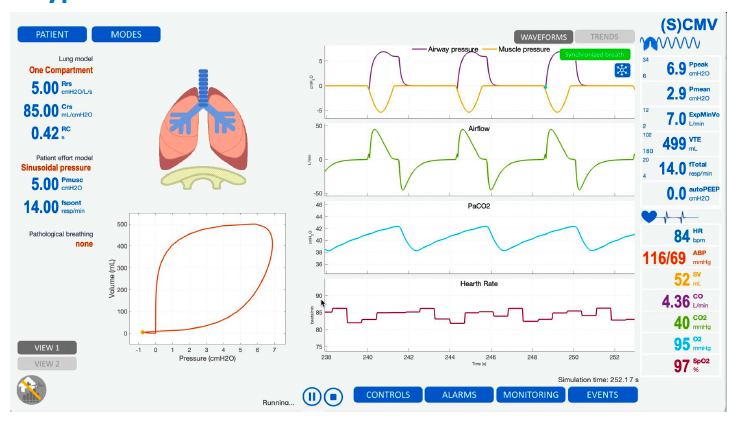MV-Optimizer
MV-Optimizer (MVO) is a clinical forecasting system to assist clinicians in managing mechanical ventilation (MV) by reproducing a specific patient's dynamic cardiorespiratory response to mechanical ventilation changes. Doctors can use MV-Optimizer to define the mechanical ventilation objectives, test different mechanical ventilation settings, and get personalized advice about the patients' most adequate therapy.

Technology Description
MV-Optimizer (MVO) is a clinical forecasting system to assist clinicians in managing mechanical ventilation (MV) by reproducing a specific patient's dynamic cardiorespiratory response to MV changes. Through MVO, doctors can define the MV objectives, test different MV settings, and get personalized advice about the patients' most proper MV therapy.
Unmet Clinical Problem
In the USA, about 310 people per 100 000 adults require MV for non-surgical causes each year (Mehta et al., 2015). In the case of Spain, this support is used in more than 40% of patients admitted to the ICU (Esteban et al., 2000). The mechanical ventilation setting is the most challenging task in an ICU. Different respiratory pathologies have different aetiologies that may lead to the need for mechanical ventilation. Patients have a different dynamic cardiorespiratory response that requires different setting adjustments. Mechanical ventilators are increasingly complex and with more operating modes and parameters to configure. No-proper configuration can risk the patient's life and involves extended hospital stays.
Setting up complex Mechanical Ventilations from different vendors relies exclusively on experienced and trained physicians. The correct ventilator setting is a crucial procedure for the patient’s recovery and weaning and a complex task that mainly relies on the physician's know-how. The many MV strategies, their not-unified nomenclatures, and the patient’s features make clinicians tend to use basic/standardized settings that do not always fit patients’ needs.
MV is one of the most difficult procedures in an ICU. It is a life-support treatment aimed at maintaining adequate alveolar ventilation and gas exchange in critically ill patients, wherein the correct ventilator settings are crucial in patients' recovery and weaning. Many doctors are reluctant to shift MV modes due to the potential impact on the patient’s recovery. No-proper configuration can risk the patient's life and involves extended hospital stays.
Proposed Solution
MV-Optimizer helps physicians to test upfront the proper Mechanical Ventilator parameters allowing reproducing of a specific patient's dynamic cardiorespiratory response to MV changes avoiding putting the patient's life at risk while reducing long hospital days.
MV-Optimizer (MVO) has two main uses: 1) A virtual simulator as a remote training tool and 2) a clinical support system for predicting the personalized response of a patient to MV changes.
MV-Optimizer integrates a dynamic human model whose parameters can be personalized from the patient's monitored signals and an MV model from which several ventilatory strategies can be set and tested. It allows the simulation of patient-ventilator interaction and patient adaptability. Data is friendly and intuitively shown.
- MV-Optimizer is a system that simulates the patient's progress according to different ventilation strategies. It provides real-world evidence so the clinician can personalize the treatment for each patient while improving patient outcomes and reducing ICU length of stay.
- MV-Optimizer integrates a ventilator model and a comprehensive human-cardiorespiratory mathematical model that is dynamically self-adjusted to each patient from their physiological variables. So, it allows the simulation of a wide variety of ventilator settings and addresses the new healthcare paradigm focused on personalized healthcare, which encourages the prediction and optimization of medical treatment.
“Boosting mechanical ventilation to the next level: better, easier and personalized therapy to improve and shorten the patient treatment and recovery”
Share: